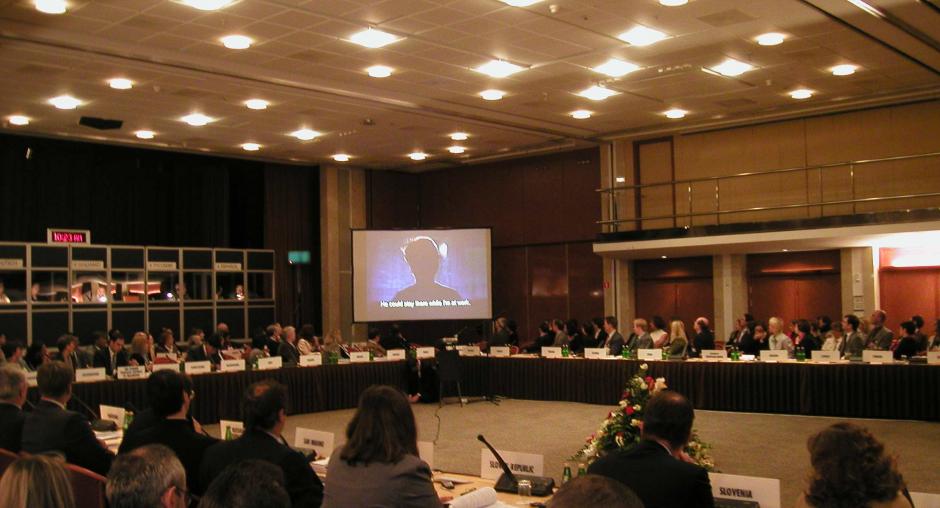Newsroom
OSCE project offers better support for trafficking victims in Kosovo
PRISTINA 9 October 2002

(OSCE)A victim's testimony is shown at a special session on trafficking in human beings at the OSCE Human Dimension Implementation Meeting, Warsaw, 9-19 September 2002. (OSCE) Photo details
PRISTINA, 9 October 2002 - In future, victims of trafficking should be offered stronger support in Kosovo, thanks to an OSCE-funded legal aid project that will strengthen Victims have, up till now, often been treated as prostitutes, not informed about their legal rights, and not always provided with access to legal representation or interpreters.
The OSCE Project of Legal Aid for Victims of Trafficking comes as a response to the often, inadequate, and inappropriate, treatment of alleged victims of trafficking. It aims to ensure that victims receive adequate support and legal assistance, both outside and before the court, in order to prevent further victimization.
"Legal assistance is especially needed in two kind of cases", explains Carsten Weber the Director of the OSCE Human Rights & Rule of Law Department. "First, when alleged victims act as a witness or injured party in criminal proceedings against an alleged trafficker; secondly, when they are charged with a criminal offence such as prostitution or illegal entry into Kosovo".
Kosovo, like other southeast European territories, has become an attractive destination for trafficking in human beings, the primary purpose of which is sexual exploitation. Though victims are mostly from eastern European countries, cases of internal trafficking also exist.
The project, funded by the OSCE Office for Democratic Institutions and Human Rights (ODIHR), began in 2001 with the involvement of members of the Kosovo Bar Association, who were trained and engaged to represent victims.
It has continued this year with the strengthening of the capacity of legal aid non-governmental organizations (NGOs). Two of the NGOs that had previous experience in dealing with victims of trafficking - the Centre for Protection of Women and Children and the Association for Legal Aid for Women - were identified and selected for specific training.
Five training sessions were offered from February until October 2002. The two NGOs were introduced to the particular legislation and mechanisms to combat trafficking, as well as the relevant police standard operating procedures and court proceedings. Attention was also paid to UNMIK Regulation 2001/4, On the Prohibition of Trafficking in Persons in Kosovo.
The OSCE Project of Legal Aid for Victims of Trafficking comes as a response to the often, inadequate, and inappropriate, treatment of alleged victims of trafficking. It aims to ensure that victims receive adequate support and legal assistance, both outside and before the court, in order to prevent further victimization.
"Legal assistance is especially needed in two kind of cases", explains Carsten Weber the Director of the OSCE Human Rights & Rule of Law Department. "First, when alleged victims act as a witness or injured party in criminal proceedings against an alleged trafficker; secondly, when they are charged with a criminal offence such as prostitution or illegal entry into Kosovo".
Kosovo, like other southeast European territories, has become an attractive destination for trafficking in human beings, the primary purpose of which is sexual exploitation. Though victims are mostly from eastern European countries, cases of internal trafficking also exist.
The project, funded by the OSCE Office for Democratic Institutions and Human Rights (ODIHR), began in 2001 with the involvement of members of the Kosovo Bar Association, who were trained and engaged to represent victims.
It has continued this year with the strengthening of the capacity of legal aid non-governmental organizations (NGOs). Two of the NGOs that had previous experience in dealing with victims of trafficking - the Centre for Protection of Women and Children and the Association for Legal Aid for Women - were identified and selected for specific training.
Five training sessions were offered from February until October 2002. The two NGOs were introduced to the particular legislation and mechanisms to combat trafficking, as well as the relevant police standard operating procedures and court proceedings. Attention was also paid to UNMIK Regulation 2001/4, On the Prohibition of Trafficking in Persons in Kosovo.
